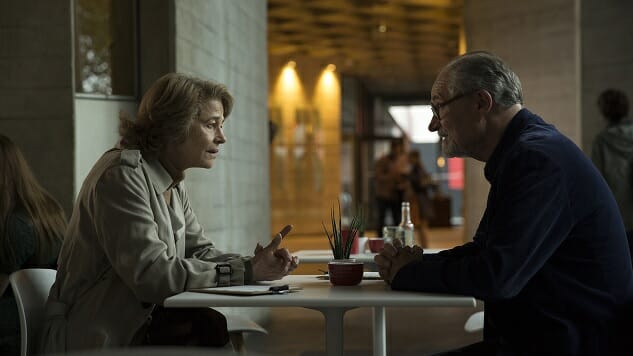The Sense of an Ending

Memory is a funny thing. We are often so certain in the accuracy of our lives’ recollections that we never bother interrogating them, and so when we’re given reason to it feels as though the existential rug is being pulled from under our feet. The realization that we may not have as firm a grasp on our own remembrances as we’d like to think can be traumatic. In The Sense of an Ending, the new movie from Ritesh Batra, that realization can also be cathartic. The film dramatizes the act of confronting and reframing the past as a painful but liberating one, a purging that chafes the soul before soothing it.
Batra, working off of a script by Nick Payne, has adapted The Sense of an Ending from Julian Barnes’ 2011 Man Booker Prize-winning novel of the same name, a brisk tale about the willful distortion of memory. Barnes wrote the book in two parts, beginning in the 1960s before segueing into the 2000s, where the lion’s share of the story unfolds. By contrast, Batra’s film weaves past and present elegantly, seamlessly looping back and forth from one to the other. That architectural shift lends The Sense of an Ending a natural, reflective rhythm on the screen as divorced and crotchety retiree Tony Webster (Jim Broadbent) goes about his daily routine, making brusque small talk with his postman, taking his very pregnant daughter Susie (Michelle Dockery) to birthing classes and running his shop, a vintage camera store with a limited and decidedly ambivalent patronage.
That rhythm is interrupted when Tony receives a letter in the mail, a bequest from the will of Sarah (Emily Mortimer), mother of his first love Veronica (Charlotte Rampling). When Tony goes to claim the items promised him in the letter, he learns that Sarah also left him the diary of his old school chum, Adrian (played in flashbacks by Joe Alwyn), with which Veronica refuses to part. This, understandably, sticks in Tony’s craw, as he, like us, is in the dark: Why did Sarah leave Adrian’s diary to him? What significance does it hold for Tony as an old man? Why does Veronica insist on keeping it out of his hands? You get the sense that Batra wants his viewers to see the diary as a time bomb capable of irrevocably altering the landscape of the film if detonated. He also wants us to accept that its detonation is inevitable.
-

-

-

-

-

-

-

-

-

-

-

-

-

-

-

-

-

-

-

-

-

-

-

-

-

-

-

-

-

-

-

-

-

-

-

-

-

-

-

-








































